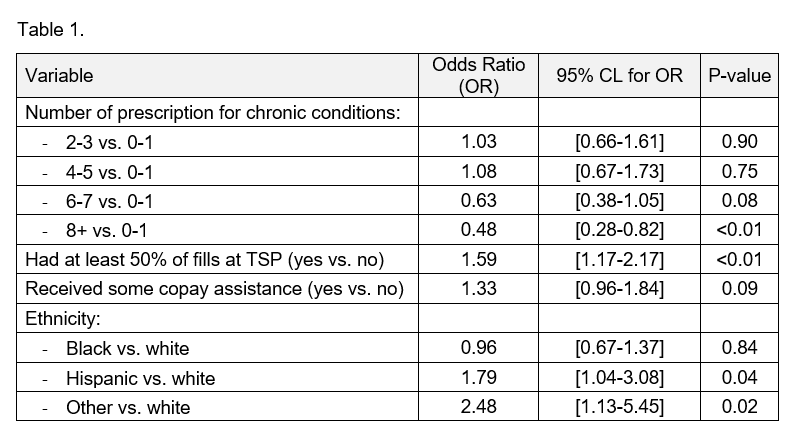Immunosuppressant Adherence in Adult Heart Transplant Recipients: An Analysis of Pharmacy Claims and Organ Procurement and Transplantation Network Data
W. S. Cherikh1, A. R. Wilk1, J. Maghirang1, E. A. Witt2, H. Kirkham3, S. Boghani2, N. Hira4, G. Pietradoni2, D. K. Klassen1
1United Network for Organ Sharing, Richmond, VA, 2Walgreens Co, Deerfield, IL, 3Walgreens Co, Deerfied, IL, 4AllianceRx Walgreens Prime, Orlando, FL
Meeting: 2019 American Transplant Congress
Abstract number: D306
Keywords: Heart, Immunosuppression, Multivariate analysis
Session Information
Session Name: Poster Session D: Psychosocial and Treatment Adherence
Session Type: Poster Session
Date: Tuesday, June 4, 2019
Session Time: 6:00pm-7:00pm
 Presentation Time: 6:00pm-7:00pm
Presentation Time: 6:00pm-7:00pm
Location: Hall C & D
*Purpose: The current study was conducted to determine characteristics that are associated with immunosuppressant (IS) medication adherence among adult recipients of deceased donor heart transplants (TXs) in the U.S.
*Methods: Prescription claims data for IS medications from a single, large national pharmacy chain during 2013-2016 were merged with the Organ Procurement and Transplant Network data. The analysis was limited to adult recipients of deceased donor heart TXs performed within a year (± 90 days) prior to the first fill, and who had >2 pharmacy claims for any IS at least 150 days apart in the 12-months after their first fill during the study period. The analysis was further conditioned on 2-year survival, which resulted in 949 recipients who were TXed between 2011 and 2015. In this analysis, adherence to IS medication was defined as proportion of days covered by pharmacy claims >=90%. A multivariable logistic regression was used to develop an explanatory model using various patient and pharmacy claim variables. The results of the analysis are summarized as odds ratio (OR), 95% confidence limit (CL) of the OR, and p-value.
*Results: 577 (61%) of recipients in the analysis were adherent. Median age at transplant was 55 years and the majority (90%) of recipients had a diagnosis of cardiomyopathy. Table 1 summarizes variables that were associated with adherence with an overall p-value of <0.10. The number of prescriptions for chronic conditions of 8 or more was significantly associated with decreased adherence (OR=0.48; p<0.01). Variables positively associated with adherence included having at least 50% of fills at a TX specialized pharmacy (TSP) (OR=1.59; p<0.01) and receiving some copay assistance (OR=1.33, p=0.09). Hispanic recipients and recipients of “other” ethnic groups were significantly more likely to be adherent compared to white recipients (OR=1.79; p=0.04 and OR=2.48; p=0.02, respectively). Black recipients were no more or less adherent than white recipients.
*Conclusions: In a cohort of adult heart recipients, in which the majority had cardiomyopathy, the number of prescriptions for chronic conditions, filling at a TSP, and ethnicity were significantly associated with IS adherence. As non-adherence to IS medication has been associated with poor post-transplant clinical outcomes, understanding patterns of IS adherence among transplant recipients is essential.
To cite this abstract in AMA style:
Cherikh WS, Wilk AR, Maghirang J, Witt EA, Kirkham H, Boghani S, Hira N, Pietradoni G, Klassen DK. Immunosuppressant Adherence in Adult Heart Transplant Recipients: An Analysis of Pharmacy Claims and Organ Procurement and Transplantation Network Data [abstract]. Am J Transplant. 2019; 19 (suppl 3). https://atcmeetingabstracts.com/abstract/immunosuppressant-adherence-in-adult-heart-transplant-recipients-an-analysis-of-pharmacy-claims-and-organ-procurement-and-transplantation-network-data/. Accessed July 13, 2025.« Back to 2019 American Transplant Congress

